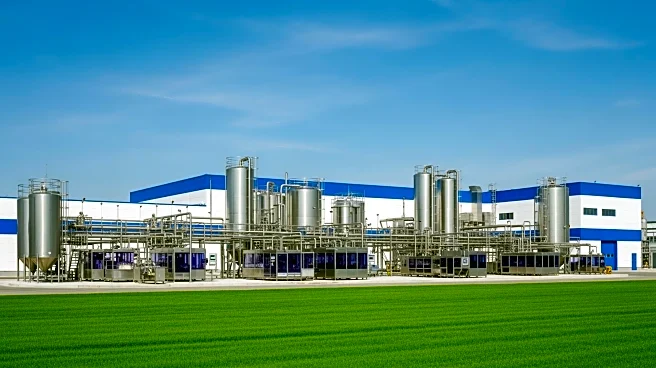What's Happening?
Arla Foods, the UK's largest dairy cooperative, is celebrating 50 years of cheese-making at its Lockerbie site with a significant investment of over £144 million. This investment includes a £34 million upgrade
to the cheddar facilities and the establishment of a £90 million Centre of Excellence for UHT and lacto-free milk production. The site, which processes over 600 million liters of milk annually, is set to become a hub for long-life and specialty milk, creating 90 new local roles. Additionally, a £20 million anaerobic digestion plant is nearing completion, aimed at enhancing the site's sustainability by converting waste into renewable energy.
Why It's Important?
The investment in Lockerbie is a major boost for the local economy and the Scottish dairy sector, which is valued at over £560 million. By expanding its production capabilities and focusing on sustainability, Arla Foods is strengthening its position in the UK dairy industry. The new Centre of Excellence will not only create jobs but also foster innovation in milk production. The anaerobic digestion plant will contribute to reducing emissions, aligning with broader environmental goals. This development reflects confidence in the future of Scotland's dairy sector and supports the local community and farmers.
What's Next?
As the investment program progresses, Arla Foods plans to continue enhancing its production facilities and sustainability efforts. The completion of the anaerobic digestion plant will further integrate renewable energy into the site's operations. The expansion of the cheddar facilities and the new Centre of Excellence are expected to drive growth and innovation in the dairy industry. Stakeholders, including local farmers and suppliers, are likely to benefit from strengthened partnerships and improved milk prices. The Scottish Government has expressed support for these initiatives, highlighting their potential to boost the economy and promote sustainable practices.
Beyond the Headlines
The investment in Lockerbie not only supports economic growth but also emphasizes the importance of sustainability in the dairy industry. By converting waste into renewable energy, Arla Foods is setting a precedent for environmentally responsible practices. This approach could inspire other companies to adopt similar strategies, contributing to broader efforts to combat climate change. The focus on innovation and skilled job creation aligns with national goals for economic development and public health, showcasing the dairy sector's role in providing nutritious, affordable food.











